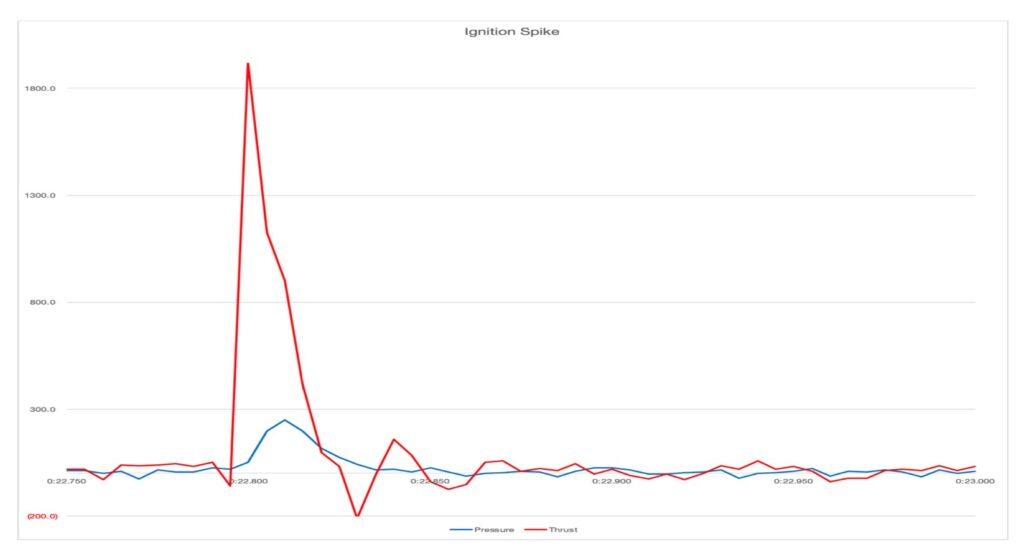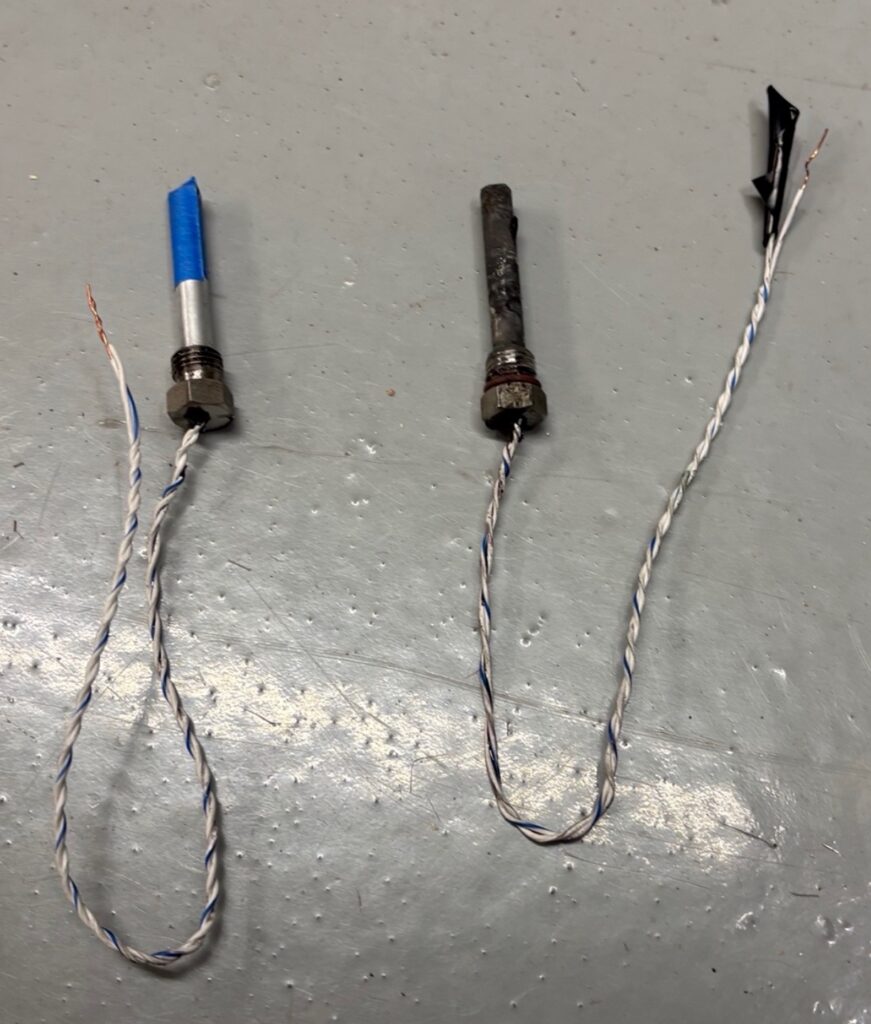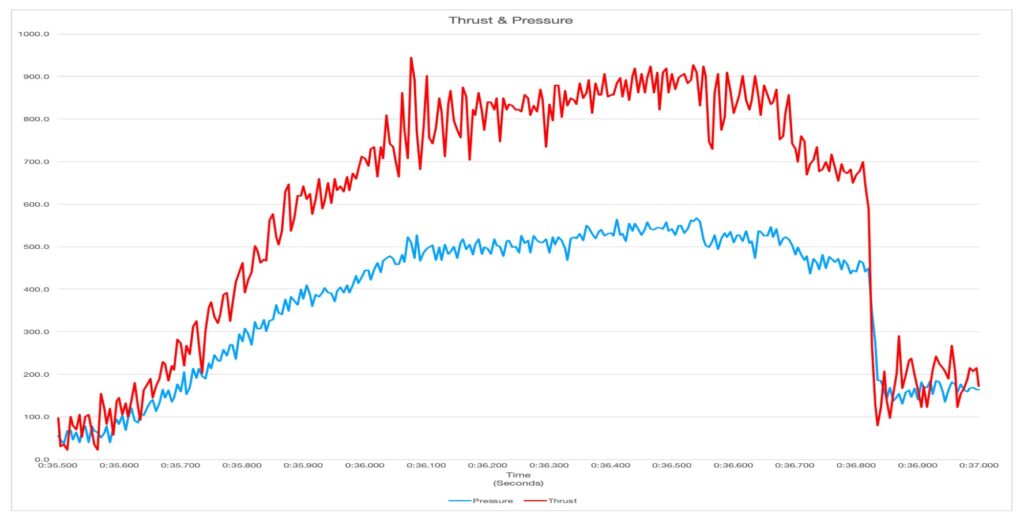Static Test Three
by Bill Claybaugh
Summary:
On 1 February 2025 we conducted a static test of a six-inch solid rocket motor at the RRS Mojave Test Area. This motor used John DeMar’s JMAX5 propellant formulation and archived a density of 0.0664 lbsm/cu.in. due to the substitution of Bi2O3 for some of the AP. The motor featured a Titanium nozzle shell with stabilized Zirconia plasma sprayed on the ID at a 0.030” nominal thickness; the nozzle throat insert was isomolded ultrafine graphite. All other motor parts were identical to previous tests.
The initiator produced an impulse with a measured peak at 1917 lbsf. at 0.005 seconds (the data system resolution), tapering off over the next 0.020 seconds. A pressure pulse measured at the bulkhead (about one inch to the side of the initiator exit) and peaking at about 250 psia at 0.010 seconds was measured over the same 0.025 second interval.
The motor fully ignited several seconds later and reached near expected pressure and thrust levels based on previous sub-scale testing. After about 0.625 seconds of steady state operation, the motor experienced a burn through near the top of one of the four internal finocyl fins.
Analysis:
Figure 1 shows the initiator thrust and pressure pulses as measured.

The measured thrust pulse cannot have been due to the bulkhead measured 250 psia pressure passing through the 1.3” diameter throat, as that would produce about 500 lbsf.; we thus conclude that it was due to high pressure in the initiator. The Initiator (Figure 2) contained approximately 0.75 grams of BKN/v (Boron and Potassium Nitrate in a Viton matrix) in three pellets, each 0.25” in diameter and 0.25” in length. The overall void length in the initiator was 1.50”, giving an internal volume of 0.072 cu.in. Given the measured thrust pulse, we can estimate the internal pressure in the initiator at about 38,000 psia assuming the full initiator diameter acted as a throat. Independent of this estimate, we can use a standard Ignition Charge Calculator to estimate the pressure in the initiator; this value is 51,600 psia with an impulse of 2500 lbsf. Recognizing that the measured peak impulse of 1900 lbsf is sampled up to 0.005 seconds after ignition of the BKN/v, we can guess that the estimated peak force of up to 2500 lbsf may have occurred within the first sample interval and before the 1900 lbsf measurement
Figure 2. Unfired and Fired Initiators.

Given the 187.6 cu.in. free volume of the motor at start and ignoring the secondary ignition charge, we can estimate that the initiator pressure pulse, expanding into the motor free volume, would equilibrate at about 33.6 psia if the free volume were closed (a 3D printed nylon environmental closure with an estimated burst pressure below 18 psia was fitted ahead of the nozzle entrance).
The secondary ignition charge consisted of an additional about 0.75 grams of BKN/v and about three grams of powered propellant and must have contributed to the measured pressure pulse. Using the Ignition Charge Calculator, we estimate that the six BKN/v pellets—totaling 1.5 grams—should have produced a pressure of about 53 psia in the motor free volume; the additional powered propellant was thus likely excessive and unneeded. Video of the test plainly shows a flame front passing out the nozzle exit immediately following ignition; we assume this represents the excess ignition charge blowing past the environmental closure / burst disk while burning.
The location of the burn through at the top of one of the finocyl voids suggests that the shock from the initiator may have caused cracking at that location because the liner is unprotected by bonded propellant mass along the finocyl fin length and the top of the finocyl is the first location where a shock would reach unprotected (by propellant) liner while propagating down the tube length. Alternatively, the pressure load from the initiator pressure pulse might have cracked the phenolic liner as it expanded into the free volume of the four finocyl fins. The free volume in the motor is about 101 cu.in. at the top of the finocyl fins, thus the original estimated 51,600 psia in 0.072 cu.in. would (ignoring temperature changes from expansion and the secondary charge) drop to about 50 psia at the point in the internal geometry where the pressure wave would reach the top of the finocyl fins. Adding an estimate of the pressure added by the secondary charge, however, does indicate a possible pressure pulse above 300 psia, in keeping with the bulkhead measurement.
Figure 3 shows the thrust and pressure buildup, stable running, and loss of pressure and thrust at the time of the motor case burn through.
Note the large (+/- 70 lbsf at zero load) variance in the thrust trace; the loadcell used was several decades old and appears to have become unstable; it should be replaced with a new, fully calibrated load cell in future. A similar (+/- 40 psi at atmospheric pressure) variance in the pressure transducer suggests it too should be replaced.
Previous testing (by John DeMar) of a 52 mm outside diameter motor indicated a burning rate coefficient of 0.046 and an exponent of 0.183. The indicated exponent is much lower than the usual 0.3 – 0.5 range found in composite propellants and suggests that this mix is unusually insensitive to increased burning rate with increasing pressure. It is known that heavy metals can decrease burn rate sensitivity and the Bismuth may be acting in that regard in this propellant.
The subscale measurements suggest that this motor should produce about 1000 lbsf at about 600 psia; the test data indicate about 850 lbsf at about 525 psia. The difference between estimated and actual results appears to be nearly fully accounted for by a small change in the burning rate coefficient (0.039 in this test rather than the 0.046 in the subscale test).
Figure 3 Thrust and Pressure

Actions:
An Initiator test program has been started to find the optimal loading of the initiator and the correct amount of secondary igniter charge to produce a repeatable but smooth buildup of pressure in the six-inch motor. Initial analysis indicates that a single pellet (0.25 grams) of BKN/v will produce a force of about 830 lbsf., implying an internal pressure in the initiator of about 17200 psia which could be expected to result in about 20.3 psia in the initial grain free volume. Follow-on experiments will look at placing a non-flammable powder (Talc) between two BKN/v pellets in the initiator as well as modifying the BKN/v formulation for lower impulse.
Analysis using the Ignition Charge Pressure Calculator indicates that the initial motor free volume can be pressurized to about 54 psia using a total of six pellets (1.5 grams) of BKN/v. Replacing the existing 0.050” thick nylon environmental closure / burst disk with an identical design using 6061-T6 aluminum will result in the burst disk failing at about 23 psia, since this is not a significant improvement over the current less than 18 psia, the nylon disk will continue tobe used pending further analysis and testing.
Conclusions:
An excessively strong initiator pulse, combined with too large a secondary charge, appears to have cracked the motor’s phenolic liner at the top of one of the finocyl voids due either to an initiator induced shock or to a too high-pressure pulse propagating down the propellant core. This in turn lead to subsequent burn through of the motor wall at the top of one of the finocyl fin voids.
The data also indicate that this propellant is too slow burning for this motor, since the indicated total burn time is about 12 seconds and the motor liner is tested to 10 seconds; for future tests we will revert to the JMAX 3A formulation which is modeled to produce an about eight second burn in this motor albeit at much higher thrust.
The Titanium shelled nozzle appears to have survived without damage and will be reused in the next motor.
Special thanks to John DeMar and Robert DeHate for their considerable help and expertise in developing this propellant. Keith Yoerg kindly acted as Pyro-op for this test and Rushd Julfiker (RRS Research Director) joined us to familiar himself with the data acquisition system. Many thanks to John Newman for loaning an AN fitting to complete the assembly of the pressure tap on the motor; we could not have complete this test without his aid.






